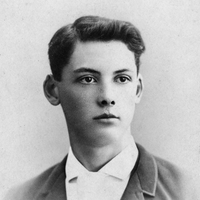Nimmo
Since you remember Nimmo, and arrive
At such a false and florid and far drawn
Confusion of odd nonsense, I connive
No longer, though I may have led you on.
So much is told and heard and told again,
So many with his legend are engrossed,
That I, more sorry now than I was then,
May live on to be sorry for his ghost.
You knew him, and you must have known his eyes,—
How deep they were, and what a velvet light
Came out of them when anger or surprise,
Or laughter, or Francesca, made them bright.
No, you will not forget such eyes, I think,—
And you say nothing of them. Very well.
I wonder if all history’s worth a wink,
Sometimes, or if my tale be one to tell.
For they began to lose their velvet light;
Their fire grew dead without and small within;
And many of you deplored the needless fight
That somewhere in the dark there must have been.
All fights are needless, when they’re not our own,
But Nimmo and Francesca never fought.
Remember that; and when you are alone,
Remember me—and think what I have thought.
Now, mind you, I say nothing of what was,
Or never was, or could or could not be:
Bring not suspicion’s candle to the glass
That mirrors a friend’s face to memory.
Of what you see, see all,—but see no more;
For what I show you here will not be there.
The devil has had his way with paint before,
And he’s an artist,—and you needn’t stare.
There was a painter and he painted well:
He’d paint you Daniel in the lion’s den,
Beelzebub, Elaine, or William Tell.
I’m coming back to Nimmo’s eyes again.
The painter put the devil in those eyes,
Unless the devil did, and there he stayed;
And then the lady fled from paradise,
And there’s your fact. The lady was afraid.
She must have been afraid, or may have been,
Of evil in their velvet all the while;
But sure as I’m a sinner with a skin,
I’ll trust the man as long as he can smile.
I trust him who can smile and then may live
In my heart’s house, where Nimmo is today.
God knows if I have more than men forgive
To tell him; but I played, and I shall pay.
I knew him then, and if I know him yet,
I know in him, defeated and estranged,
The calm of men forbidden to forget
The calm of women who have loved and changed.
But there are ways that are beyond our ways,
Or he would not be calm and she be mute,
As one by one their lost and empty days
Pass without even the warmth of a dispute.
God help us all when women think they see;
God save us when they do. I’m fair; but though
I know him only as he looks to me,
I know him,—and I tell Francesca so.
And what of Nimmo? Little would you ask
Of him, could you but see him as I can,
At his bewildered and unfruitful task
Of being what he was born to be—a man.
Better forget that I said anything
Of what your tortured memory may disclose;
I know him, and your worst remembering
Would count as much as nothing, I suppose.
Meanwhile, I trust him; and I know his way
Of trusting me, and always in his youth.
I’m painting here a better man, you say,
Than I, the painter; and you say the truth.

